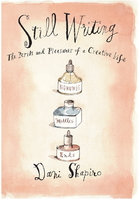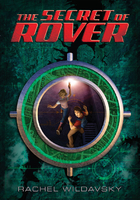MILES PARKED IN FRONT of the house so that Tillie would be able to pull out of the driveway unhindered. Anything to make life easier for Tillie, since God knows she was a handful. Tillie had to be coddled, especially when she was throwing a snit. Home Help was very hard to come by.
Miles got out of his battered old Pinto and was walking up the driveway to the back door—he always entered the house through the kitchen—when suddenly Tillie stood before him, quivering in her considerable bulk, her face the color of raw meat. She had her magazines rolled up under her arm. And she carried a shopping bag containing her nightgown, her robe, her slippers, and her "personals," as she called them.
"I quit," she said. "Mail the wages by check, please."
"What's happened?" Miles said. "What's the matter?"
"Not responsible for that woman. I am a health care, not a nanny. I quit." She fitted herself into the driver's seat of her little Volkswagen. "Do not send cash in the mail," she said. "Send a check." She backed out of the driveway with the no-nonsense dispatch she had brought to the care of his mother.
Miles stood in the driveway, staring after her.
"Ugliness, misery, and piss," he said. He was furious at Tillie, not only because she'd quit but especially because she'd ruined the best night of his life.
He and Margaret had just made love and they were lying in bed, his arms loosely about her, her head tucked into the hollow between his neck and shoulder. They fitted together perfectly, they were the perfect couple, he was at last perfectly a man. He didn't want to disturb this mood; he wanted it to go on forever, but he had drunk all that booze and now he had to pee. He leaned over her and whispered, "I'll be right back," and eased himself gently out of bed. Passing through the living room, he paused for a second by the telephone, and then put the receiver back on the cradle. Instantly the phone rang. It was Tillie.
"I've been calling for hours," she said. And in a low voice, she added, "I've had enough."
Unlike the others, Tillie had never threatened to leave. She had contented herself with shooting an evil glance at Eleanor or from time to time sticking out her chin at Miles. Her contempt for both of them was palpable. She didn't have to threaten. They knew that unless they were careful, she'd leave. Period. And they'd not been careful enough. So when she said, "I've had enough," she meant it. Tillie didn't fuck around, so to speak. She had always demanded her money in good old tax-free cash—eight hundred a month, in twenties—and if she was willing to take a check, it was a sure sign she was all done. Furthermore—the killer detail—she had taken her wrestling magazines and her famous "personals." That was it. Over and out. Sayonara, Tillie.
He'd have to hire somebody new, before Monday, or miss a day of school while he took care of his mother. Imagine breaking that news to Endicott.
And what, he wondered, would he find inside the house?
In the house the only sounds came from the living room, where Johnny Carson was forcing laughs out of Ed McMahon. Had Tillie taken off without even getting his mother into bed? He tiptoed into the room and sure enough, there was Eleanor, propped up in her rocker, smiling at him.
She was wrapped in her pink wooly blanket, bright-eyed and expectant, glad to see him home at last. But where was he going to find another Home Help? And with only two days' notice? Had she no idea what she was doing to him? His fury at Tillie changed into fury at his mother.
He lowered the volume on the television, and when he turned to face her he could see the eagerness drain from her eyes. Good. But then at once he went to her and, moving her aluminum walker out of the way, he knelt beside her and kissed her on the cheek.
"Are you all right, Mother?"
She nodded, wary. She knew how angry he was.
"Well, what happened with Tillie?"
She shook her head and whispered, "Nothing," but no sound came out. She gestured toward her little pad, and when Miles gave it to her, she wrote: "Nothing."
"Nothing? Did you fight with her?"
She laughed, a breathy sound, rasping. "How could I?" she wrote.
"Well, she quit," he said.
She only smiled.
"But why, Mother? Why would she quit?"
She bent over her pad, writing, and when she was done she laughed silently and looked up to see if he was laughing too. She had written: "Bitch."
He clenched his teeth hard so she would see how annoyed he was, and then he said, "I'm going to take a look upstairs."
He went upstairs whenever he felt about ready to kill her.
Upstairs were the two small bedrooms that had been his and Erin's until they'd left home—Erin when she married Joe Flaherty and began to have all those kids; Miles, when he went to college and grad school and then got his own apartment in Cambridge. He'd come back home a year and a half ago, just after his father's death, when it became clear that Eleanor needed somebody to take care of her. His sister Erin had pointed that out. "I've got my family in California," she said. "I've got my life out there. Anyway, you're the son."
He had moved into his old room, and almost at once Eleanor went to pieces. It was as if she'd been holding herself together by an act of the will, and now that she could collapse, she did. Her speech went first, and then her ability to swallow food, though she pretended to Miles she nibbled during the day and that's why she was never hungry at dinner. She had trouble walking. She dropped things all the time. She was very weak. Dr. Archer had long since diagnosed the problem as ALS and had promised a fairly painless death, though a slow one. This sudden deterioration took the doctor by surprise. She gave Eleanor a thorough examination. She called in a back-up physician. They consulted. Eleanor was hospitalized for severe malnutrition, a gastrostomy was performed, and she was fed by tube after that.
This was over a year ago, and since that time Miles had been his mother's nurse and companion except when he was teaching school or when he had his Friday night off.
Eleanor's own schedule was unvaried. Once a week she had the therapist, and every morning at nine the nurse's aide came to bathe her, dress her, and get her ready for the day. And then, at ten, the Home Help of the moment turned up; for several months there had been Edna Gutkin, mad as a hatter, and then Angie Slocum who wanted to write poetry, Bertha Jones who didn't want to do anything, Susu Waters and Pilar Sanchez who lasted only three days each, and now the dread Tillie, though even she was a thing of the past. These Home Helps had cost him first his salary, then his small savings, and finally he had taken a second mortgage on the house—the money from the large first mortgage had gone to Erin to help with the family—and now he was wondering if he could get a loan through the Credit Union at school. He had to get a new car. The orange Pinto was rusted out underneath and was falling apart bit by bit. It would never last the winter.
Miles stood at the window of his old room looking out at the small backyard. The picnic table his father had built so many years ago was warped and pitted from the winter snow and from all that rain in spring. The fireplace looked bad, too. His father had built it with brick but without mortar, just in case they ever wanted to take it apart and move it somewhere else. It had stood there for more than twenty years, half-covered now by the clump of birches broken in the ice storms last March. A ruined garden, he thought to himself. Like "Araby." All they needed was a bicycle pump coiled beneath a tree. "I saw myself as a creature driven and derided by vanity,' he said aloud, and wondered how often James Joyce had fed his mother through a tube in her stomach or helped her to the toilet in the middle of the night or tried to deal with Home Helps whose only interest was in wrestling magazines.
"Poor moi," he said aloud, impatient with himself, and then he went down to his mother, taking two stairs at a time.
"Okay, you sweet old thing in your pink blanky," he said, "we're free at last of the dread Tillie." He did Martin Luther King, Jr.: "Free at last, free at last, thank God A'mighty, we're free at last." He knelt by her side and gave her a hug.
"My good old mum. Did she give you dinner? That stuff?"
Eleanor nodded yes.
"And got you to the toilet okay? Are you all right?"
"I fell," she wrote.
"Are you okay? Are you hurt? Mother?"
Slowly, laboriously, she wrote down what had happened. Then she added, "I felt like that bug," but she could see he didn't get it.
"But you're all right?"
She nodded, pleased, and wrote, "I got to the bathroom and back, by myself."
"You're a trouper," he said. "You're a tigeretta. A student told me today he has a dog named Doggina. And Margaret sends her love. You're really all right?"
He helped her to her room and began the nightly ritual of getting her into bed. He took her robe and lay it on a chair, waiting while she shuffled back and forth and got herself into position to plop down on the side of the bed. Once she was sitting, he let her catch her breath, then he lifted her legs and eased them under the covers, getting her backrest at the proper angle so that she was half-sitting, half-lying. She caught her breath again as Miles hovered, useless for the moment, while she somehow edged her body over inch by inch until she was in the center of the bed. He put the box of tissues near her left hand and made sure the buzzer was near her right. He kissed her on the forehead. He smiled at her.
"I'll be in the next room,' he said. "Okay? So don't worry about buzzing."
He settled on the living-room couch, his head in his hands, still breathing hard. At once he remembered his promise to call Margaret. His head ached, he didn't want to call anybody, he wanted to scream and then cease upon the midnight with no pain. But you just had to get through these things. You just had to do them.
"Ugliness, misery, and piss," he said.
He phoned from the kitchen, squinting against the bright overhead light. Margaret answered at once.
"What's the matter?" she asked. Her voice sounded very far away.
"I promised to call," he said. "About my mother."
"Oh."
"You asked me to call." He paused. "You wanted me to let you know if everything is all right."
"That's right, that's right," she said, and laughed softly. "Well, when am I going to see you again?"
"What?"
"Come on, now. Come on. When am I going to see you again?" She was being coy.
"Are you drunk?" he asked. "Margaret?"
There was silence for a moment.
"Margaret, what's the matter with you?"
"Nothing."
"Well, why are you talking like that?"
"Like what? What is the matter with you, Miles?" Her voice was suddenly very clear. "Well?"
"Tillie quit."
"I don't happen to like being told I'm drunk, Miles. I've been through that with one man and I'm not going through it with another."
"I'm sorry," he said. "It's just that you didn't sound like … yourself. And I'm semi-distraught. And that bitch Tillie has quit on me."
"I don't happen to like being called a drunk."
"I'm sorry. I didn't mean anything. Okay?"
"I don't like it."
"I'm sorry, Margaret. Really."
"Okay. So when am I going to see you, hmmm?" Her voice was far away again.
"Tomorrow," he said, shivering. "I'll call tomorrow."
"Yes," she said. "Sleepy, drowsy. Nighty-night." Her voice was blurry and she was repeating "Sleepy, drowsy," as she hung up the phone.
Miles put down the receiver and stood, dumb, with one hand over his mouth. He couldn't grasp it. Someone he knew and loved had just slipped into darkness. Had gone away. Had become some other person. Some thing. He would call her back right now.
He was reaching for the phone when it rang. He checked his watch. 1:00 a.m. Someone was phoning him at 1:00 a.m.
"Bannon? Miles Bannon?" It was the principal, of course.
"Yes?"
"This is Bill Endicott and I've been trying to get ahold of you all night long."
"Do you have any idea what time it is?" Miles said.
That slowed him down.
"Are you at all aware that I have a very sick mother who gets very little sleep at the best of times? Do you have any idea what it's like for her when the phone rings in the middle of the night? Do you?"
"I'm sorry about your mother."
"Yes, well. What do you want?" It was nice, even for a moment to feel you had the upper hand with this bastard. And to hell with the consequences. "Well?"
"That incident today, in the locker room. Did you see it? How come you were there?"
Miles explained briefly, angrily, that he had been showering, that he heard noise and then kids running, that he had gone to investigate and found Billy lying in his blood that way. "Of course I wasn't there," he said. "Of course I didn't see it. Are you out of your mind?"
"Well, I want you to forget about it. I want you to forget it ever happened."
Forget. Wouldn't that be nice, Miles thought.
"Miles? Do you understand?"
"You want me to forget," Miles said.
"They've treated him at the hospital and he's going to be just fine. It's a small tear in the testicles, they gave him stitches, and he's going to be fine. They were just horsing around, just kids, that's all it was, and it got a little out of hand. The parents are not pressing charges. I told them how the publicity would be bad for the boy. They could see that I was right. So they're not pressing charges. And the police are going to overlook it. I know the Chief. But it's the boy I'm thinking of. The boy wants to just forget about it. So it's better that this shouldn't get out. You know, to other parents, or to the kids, or to anybody. So. Do you understand?"
"You mean you and the police are going to cover it up."
"Jesus Christ, Miles, don't you ever listen? The boy doesn't want any publicity on this. And neither do his parents. It's our obligation as educators to protect the boy from public embarrassment. It's their wish. It's their right to decide this. I'm only doing what's best for the boy."
"And for you. For your job."
There was silence for a moment and then the principal said, in the hard voice Miles knew best, "Listen, Bannon. You come and see me Monday morning as soon as you get to school. And not a word about this incident to anybody. This will all go away if nobody says anything. Understand?"
Miles said nothing. He felt sick.
"I will hold you personally responsible if this gets out. I'll have your ass. Do you understand that? Are you there?"
Suddenly the room vibrated to a loud clanging sound, metallic to begin with and then amplified many times over. Pure irritant. It was Eleanor's night buzzer.
"What the hell is that?" the principal said. "Did you do that deliberately? Right in my ear?"
"You woke my mother," Miles said, and hung up.
The buzzer sounded again. Miles had asked the electrician to install something that could wake the soundest sleeper and this is what he got, a torture device.
"Coming, coming," he called, and in seconds was at his mother's bedside. "It's the nice lady who's full of pee," he said. "Come on, you sweet thing, I'll help just a little." He slipped his right arm beneath her shoulders to lift her up, and with his left arm he pulled her legs toward him until finally, exhausted from the effort, she was sitting on the side of the bed. She had to wear a short nightgown, since she could not manage the toilet with long ones, and now it was hiked up to her thighs. She plucked at it, but could not pull it lower. "It's all right, Mother, you're fine," he said, tugging it down for her, and then he slipped her bedjacket over her shoulders and positioned the walker. She sat on the bed moving her feet up and down. "Slippers," he said, "of course," and knelt to put them on. Her feet were icy and stiff-jointed, bloodless; the feet of a dead person.
Was she dying? He looked up at her and she was looking back, a strange expression on her face. Sometimes she looked right into him and knew what he was thinking. He could feel himself blush.
"All rightikins," he said, "that takes care of the footies." He positioned the walker for her once again. She looked at it. "What?" he said. "Are you all right? Are you okay? What should I do?" He could hear something in his voice—panic or desperation or maybe just tiredness—and she heard it too, and so she went into action at once. She leaned forward on the bed and put her two hands on the walker. She spread her feet a little and rocked back and forth on the bed and then made a lunge at the walker. She didn't quite make it. She fell back on the bed and started again, rocking slowly, concentrating. "Here, let me help you," Miles said, but she shook her head no, and made another attempt. This time she got it. She stood, testing for balance, and when she was sure she was steady, she gave him a big smile. "Not dead yet," she said, but no sound came out. He smiled back. The thing to concentrate on was just getting through this, even if he did want to scream. Get through it. Be kind. Period.
She shoved the walker forward a few inches at a time, while Miles moved slowly behind, ready to catch her if she should collapse. He began to sing through his nose, à la Willie Nelson, "On the road again, full of pee and on the road again, she's going someplace that she's often been before," until his mother stopped and bent over the walker, shaking with laughter, and he was glad because he was getting through it without making her feel bad. Finally they were there. He sat her on the toilet seat, and said, as always, "You take your time, and bang your walker when you're ready for me. Okay? Okay."
He went out to the kitchen and stood next to the phone. Should he call Margaret? Endicott? The Suicide Prevention Hotline? He sat down next to the phone and stared at it. How could you explain Margaret? She must have had a drink, or five, as soon as he'd left. Or maybe she wasn't drunk at all; maybe she'd been knocked crazy by that bastard husband of hers and the craziness only showed up an hour or two after sex. He smiled. The sex had been good, very good, after that awkward start. It was too bad he couldn't just enjoy it instead of treating it like an audition for a part he wasn't going to get. "I'm sorry, Mr. Bannon, but you're not the right type. We're looking for someone harder, longer, and with a little staying power. You're more the Silly Putty type. But we have your address and if something comes up for you, har har, we'll get in touch. Don't call us, we'll call you." He thought of Paul Ciampa; now there was a man. And then at once he thought of Billy Mack lying on the locker-room floor with the blood spreading beneath him. Poor Billy.
"How you doing in there?" he said through the bathroom door. The toilet seat banged down. "Are you decent?" He heard her rap out an answer with the walker. He pushed the door open and said, "It's just like Morse Code, isn't it: beep beep, bee bee ba-bee, beep beep." But she wasn't paying any attention to him. She was standing at her walker waving back at the toilet. She'd used the sink to pull herself upright and she'd lowered the seat, but she couldn't reach the handle that would flush the toilet. He looked at her gesturing wildly and at the fierce determination in her face and realized she wanted one thing before she died; she wanted to flush the damned toilet and she wanted to flush it now. She glared at him. He was about to explode into laughter—she was so determined, the whole business was so preposterous—when suddenly he saw through this broken old woman to the young woman she had been, proud and independent, capable of anything, and at once tears sprang to his eyes. "Oh Mother," he said, and put his arms around her, "Oh God." She began to shake silently and Miles held her. In a moment he pulled himself together. "Okay," he said, "I've got it. Voilà!" and, with an extravagant gesture, he flushed the toilet. "How's that?" he said, and gave her a little smooch on the cheek. "Okay?" he said, more to himself than to her. "Okay."
They began the trip back to her room. "On the road again, flush the john and on the road again." He sang to her, improvising, the sillier the better. He interrupted himself once to suggest it might be easier for her to use the johnny-chair, but she stopped and shook her head no, NO, and he knew she meant it, so he went on singing. "On the road again, headin' home, we're on the road again."
Finally, it was done. She was in bed, the tissues near her left hand, the buzzer near her right, her body propped at an angle that guaranteed she could never get really comfortable. She touched his hand and nodded. "Good night, Mother," he said and turned out the light as he left.
He went into the tiny den, his bedroom ever since he'd come back home to live. He got into his pajamas and stretched out on the daybed with his robe thrown over him; no sense mussing up the sheets. He glanced at his watch—1:32. So the business with the toilet had taken only twenty-five or thirty minutes, just about average. She'd need help in another two hours, and two hours after that, and two hours after that, providing everything went smoothly.
He began to speculate on which was worse: knowing someone you love is in excruciating pain or knowing that in the end the thing you feel most is the boredom.
Of course you feel love and anguish and pity. Of course you want to take away the pain, even take it on yourself. And of course you do what you have to do, and you try to do it gladly. But thinking about it is one thing, and doing it is another. And when you've done it over and over, preparing yourself for the shock of death, rehearsing the feeling of loss, of grief, of getting on with life, and still the dying goes on and on and on, you realize that the thing you feel is boredom. And shame and guilt. But boredom mainly. So which is worse? Knowing someone you love is in excruciating pain or …
He hadn't nearly finished his night thoughts when a ringing began. It took him a minute to realize it was not his mother, it was the telephone. He dashed to the kitchen, eager, hopeful. It was Margaret, surely. It had to be.
"Hello," he said, breathy, dragging out the sound the way she liked. And when there was only silence on the other end, he said, annoyed, "Yes?"
"Mr. Bannon? Is this Mr. Miles Bannon?"
"Yes?"
"The English teacher? At Malburn High?"
"Yes," he said. "What is it?"
A choking sound, like someone holding back tears. "I have to talk to you," a woman said, "about my son. He was one of your students."
"Are you crazy? Has the whole world gone crazy?" Miles spoke slowly, letting the words sink in. "It is the middle of the night. My mother is a very sick woman. And you phone me here, at home, to have a little parent-teacher conference? It's, it's …" but he could find no word that would accommodate his sense of outrage.
"I'm sorry," she said. "I'm Eileen Mack. Billy's mother."
"I'm sorry, Mrs. Mack. I had no idea it was you. I'm sorry."
"I'm sorry. I've said that though, haven't I. Well, I am. I'm sorry to be calling you this late. I'm sorry about your mother. I have to talk to you about Billy, Mr. Bannon. Now."
"Yes," he said. "Of course. Of course. Is he all right? Is he going to be all right?"
"You've got to talk with him, Mr. Bannon. That's why I'm calling. There's nobody else I can turn to. Our priest can't talk to him, and of course I can't. You're the only one he trusts."
Trusts? Billy Mack? He heard again the cry that Billy made as they were raping him with the broomstick. A wounded animal.
"Will you?" she asked. "Please? Will you talk with him?"
"Mrs. Mack," he began. "Surely you and Mr. Mack are the ones he needs at a time like this. Not a stranger like me. It's his mother and father he needs."
"Mr. Bannon, Billy hasn't talked to me in years, or anybody. And his father is a police officer."
"Oh."
"He's a cop. That's the whole thing. That's why I'm calling you. His father, when he heard about it, he was furious. He said to him, he said, 'How come you? How come they did it to you?' And he made Billy lie on the bed and take off the bandage so he could look at the stitches, and when he saw them he got even madder and he said, 'Listen to me'—and he called him a terrible name, with the F word—'listen,' he said, 'there's gotta be a reason why they picked you, and you know what it is. So tell me. So tell me.' And he kept saying that over and over and after a while he said, 'It's because they think you're a fag, isn't it? That's why they did it to you.' And my Billy, he just kept laying there with his hands over his face, and when his father finally stopped and left him alone, Billy just cried and cried. I went outside the door and waited till he was done crying, and then I went in and told him never mind, it didn't mean anything, but Billy just gave me that look he's got and said to me, 'Get out of here and go back to him.' I did, and I went down to him in the kitchen where he was having coffee before work—he's on nights—and I said to him, 'How could you do that to your own son when he's just been practically murdered?' and he looked at me the way Billy does and said, 'You're the one to blame for turning him into a … queer' … and he used the F word again. I ran out of the house in just my housedress and I walked and walked and walked, praying. I prayed that God would tell me what to do for Billy. And then all of a sudden I knew I had to call. I knew you were the one who could talk to him." She sobbed once, and was silent and then she added, "He used to love his father."
"Mrs. Mack, I don't know what to say. I'm terribly sorry about Billy and what happened to him with those kids and now with his father, but the fact is that I just don't know the boy."
She tried to say something but she was crying and he couldn't make out the words.
"I tried. He was in my English class last year, but I just couldn't get through to him. He just didn't respond."
"No, Mr. Bannon, you've got it all wrong. He talked about you all the time. You're the one name I ever heard him mention. He'll talk to you, if you just give him a chance, if you just ask him to have a little talk with you."
"Yes, of course. But … yes, I'll try."
"On Monday, will you?"
"But surely he won't be back that soon. Won't he be needing care? I mean, shouldn't he be lying down?"
"The doctor said he could go back to school as soon as he was comfortable enough, and the principal—Mr. Endicott—he came to the house and he said Billy should wait a few days, and my husband told him he didn't care what he did." She began to cry again. "He'll be there on Monday, Mr. Bannon. I know him. And you'll talk to him, please. Please. You're the answer to my prayers. Just make him not feel so bad."
"Oh God," Miles said. "I'll try. All right?"
"He'll be so grateful," she said. "And I'm so grateful. He thinks the world of you, Mr. Bannon, he does," and she went on like this until Miles interrupted and said, "Get some rest, Mrs. Mack. You'll be more help to Billy if you get some rest." And then they both hung up.
Miles looked around the kitchen, a little dazed. What kind of father did the poor kid have? To make him feel responsible for some insane … thing. Didn't he understand how kids acted in a group, especially when they were at that age, and fueled by a little booze or grass or whatever they had, and by their runaway hormones? He was a cop. Surely he knew that you didn't have to be guilty of anything to be made a scapegoat; all you had to do was be around and look right for the part.
It was unthinkable, all of it, and he was going back to bed.
He lay there and lay there, wondering if he would ever get to sleep, and then the buzzer from hell went off, electrocution by ear, and he sprang up and ran into his mother's room.
"Here I am, you sweet thing," he said, jovial and full of energy, and he began the long process of getting her out of bed for another march on the bathroom. While he helped her with her slippers, he glanced at his watch—3:05. Not bad. Two more trips, minimum. Five at the worst. He'd get through the night easily enough. And weekends were always manageable. He was a lucky man.
He moved slowly behind her, singing because it made her feel he didn't hate doing it all, "On the road again, full of pee and on the road again, going someplace she has often been before, she can't wait so she's on the road again."















